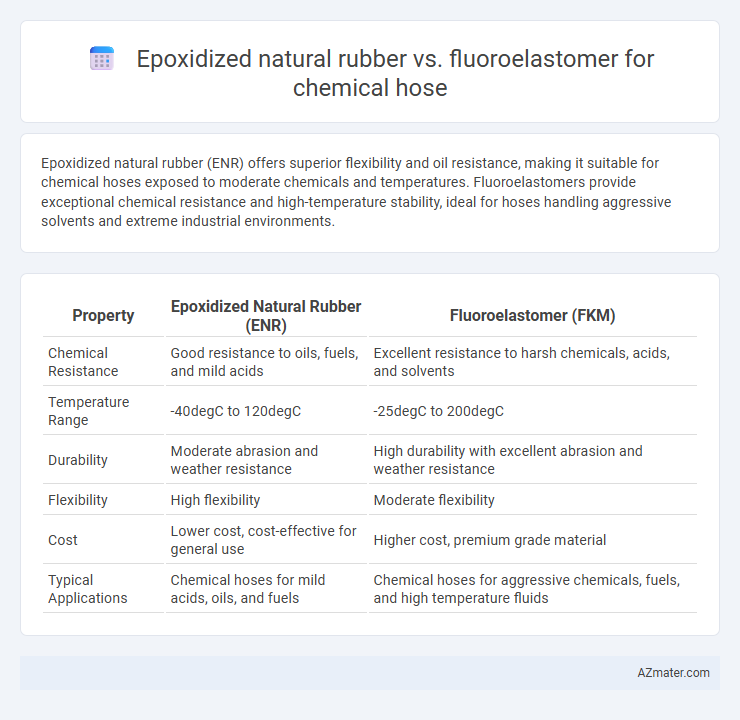Epoxidized natural rubber (ENR) offers superior flexibility and oil resistance, making it suitable for chemical hoses exposed to moderate chemicals and temperatures. Fluoroelastomers provide exceptional chemical resistance and high-temperature stability, ideal for hoses handling aggressive solvents and extreme industrial environments.
Table of Comparison
| Property | Epoxidized Natural Rubber (ENR) | Fluoroelastomer (FKM) |
|---|---|---|
| Chemical Resistance | Good resistance to oils, fuels, and mild acids | Excellent resistance to harsh chemicals, acids, and solvents |
| Temperature Range | -40degC to 120degC | -25degC to 200degC |
| Durability | Moderate abrasion and weather resistance | High durability with excellent abrasion and weather resistance |
| Flexibility | High flexibility | Moderate flexibility |
| Cost | Lower cost, cost-effective for general use | Higher cost, premium grade material |
| Typical Applications | Chemical hoses for mild acids, oils, and fuels | Chemical hoses for aggressive chemicals, fuels, and high temperature fluids |
Introduction to Chemical Hose Materials
Epoxidized natural rubber (ENR) offers excellent resistance to oils, chemicals, and abrasion, making it a versatile choice for chemical hose inner liners exposed to mild to moderate chemical environments. Fluoroelastomers provide superior resistance to aggressive chemicals, high temperatures, and solvents, ensuring durability and safety in demanding industrial chemical transfer applications. Selection between ENR and fluoroelastomer depends on chemical compatibility, temperature range, and operational requirements critical to hose performance.
Overview of Epoxidized Natural Rubber (ENR)
Epoxidized Natural Rubber (ENR) is a chemically modified form of natural rubber where epoxide groups are introduced to enhance oil, fuel, and chemical resistance, making it suitable for chemical hose applications. Its increased polarity improves compatibility with various chemicals, offering superior abrasion resistance and flexibility compared to unmodified natural rubber. ENR's enhanced thermal stability and resistance to swelling by hydrocarbons position it as a cost-effective alternative to fluoroelastomers in certain chemical transfer scenarios.
Overview of Fluoroelastomer (FKM)
Fluoroelastomer (FKM) offers exceptional chemical resistance, making it ideal for chemical hose applications where exposure to aggressive solvents, acids, and oils is common. Its high thermal stability, typically up to 200-250degC, ensures durable performance in demanding environments compared to epoxidized natural rubber, which has lower chemical resistance and thermal tolerance. FKM's superior resistance to ozone, weathering, and swelling from hydrocarbons contributes to its widespread use in industrial chemical fluid transfer systems.
Chemical Resistance Comparison
Epoxidized natural rubber (ENR) offers moderate chemical resistance, particularly against oils, fuels, and some solvents, but may degrade when exposed to strong acids, bases, and aromatic hydrocarbons. Fluoroelastomers provide superior chemical resistance across a broad spectrum, including aggressive chemicals, high-temperature hydrocarbons, and solvents, making them more suitable for demanding chemical hose applications. The enhanced resistance of fluoroelastomers ensures longer service life and reliability under harsh chemical exposure compared to epoxidized natural rubber.
Mechanical Properties and Durability
Epoxidized natural rubber (ENR) offers excellent flexibility and good abrasion resistance, making it suitable for applications requiring moderate chemical resistance and mechanical durability in chemical hoses. Fluoroelastomers (FKM) provide superior chemical resistance, heat stability up to 200-250degC, and exceptional mechanical strength, ensuring longer lifespan in harsh environments with aggressive chemicals. Fluoroelastomer hoses outperform ENR hoses in terms of resistance to oils, fuels, and solvents, resulting in greater durability and reliability under extreme chemical and thermal conditions.
Temperature Performance and Stability
Epoxidized natural rubber (ENR) offers excellent flexibility and chemical resistance with a temperature performance range typically between -50degC to 120degC, suitable for moderate heat applications. Fluoroelastomers (FKM) provide superior thermal stability and can withstand continuous operating temperatures up to 200degC, making them ideal for high-temperature chemical hose environments. The advanced molecular structure of fluoroelastomers ensures enhanced resistance to aggressive chemicals and oxidative degradation, extending hose lifespan under extreme conditions.
Cost Efficiency and Availability
Epoxidized natural rubber (ENR) offers cost efficiency due to its lower raw material and processing expenses compared to fluoroelastomers, making it a budget-friendly choice for chemical hose applications. Fluoroelastomers, although more expensive, provide superior chemical resistance, temperature stability, and durability, which can reduce replacement frequency and downtime costs over time. ENR's wide availability stems from its natural rubber base, ensuring easier procurement, while fluoroelastomers rely on specialized fluorinated compounds, limiting their availability and increasing lead times.
Environmental Impact and Sustainability
Epoxidized natural rubber (ENR) offers enhanced biodegradability and reduced carbon footprint compared to fluoroelastomers, making it a more sustainable choice for chemical hoses in environmentally conscious applications. Fluoroelastomers, while providing superior chemical resistance and durability, are derived from fluorinated polymers that are persistent in the environment and challenging to recycle. Selecting ENR supports circular economy principles by utilizing renewable resources and facilitating end-of-life biodegradation, minimizing long-term ecological impact.
Typical Applications in Chemical Hoses
Epoxidized natural rubber (ENR) is widely used in chemical hoses for applications involving moderate resistance to oils, fuels, and certain chemicals, making it suitable for food processing and water-based chemical transfer. Fluoroelastomers (FKM) offer superior chemical resistance, especially against aggressive solvents, fuels, and high-temperature chemicals, making them ideal for industrial, automotive, and aerospace chemical hose applications requiring high-performance sealing. The choice between ENR and FKM in chemical hoses depends on specific chemical exposure, temperature range, and required hose durability.
Choosing the Right Elastomer for Chemical Hose
Epoxidized natural rubber (ENR) offers excellent oil resistance, flexibility, and abrasion durability, making it ideal for chemical hoses handling acidic and mildly aggressive substances. Fluoroelastomers provide superior chemical and temperature resistance, particularly against harsh solvents, fuels, and high-temperature chemicals, ensuring long service life in extreme environments. Selecting between ENR and fluoroelastomer depends on chemical compatibility, operating temperature range, and application-specific performance requirements for optimal hose longevity and safety.

Infographic: Epoxidized natural rubber vs Fluoroelastomer for Chemical hose
 azmater.com
azmater.com